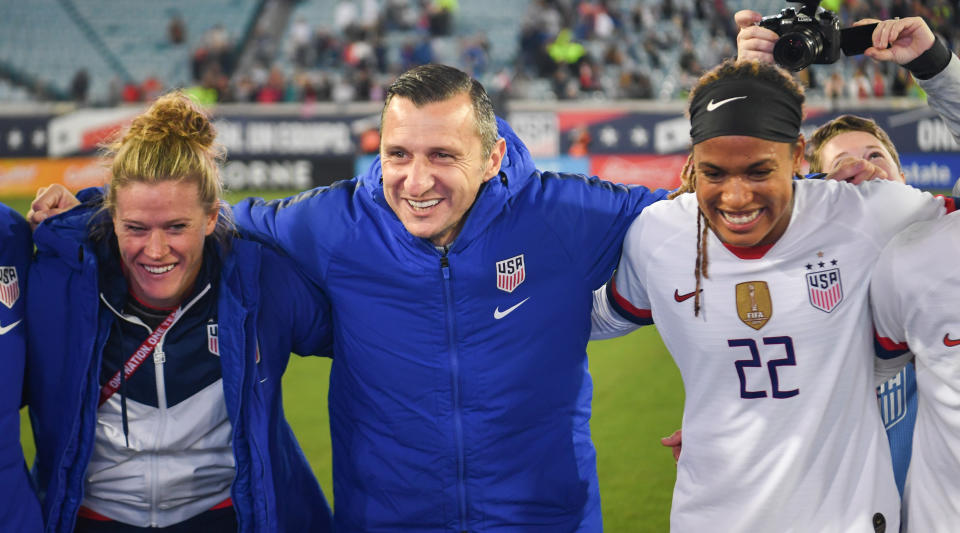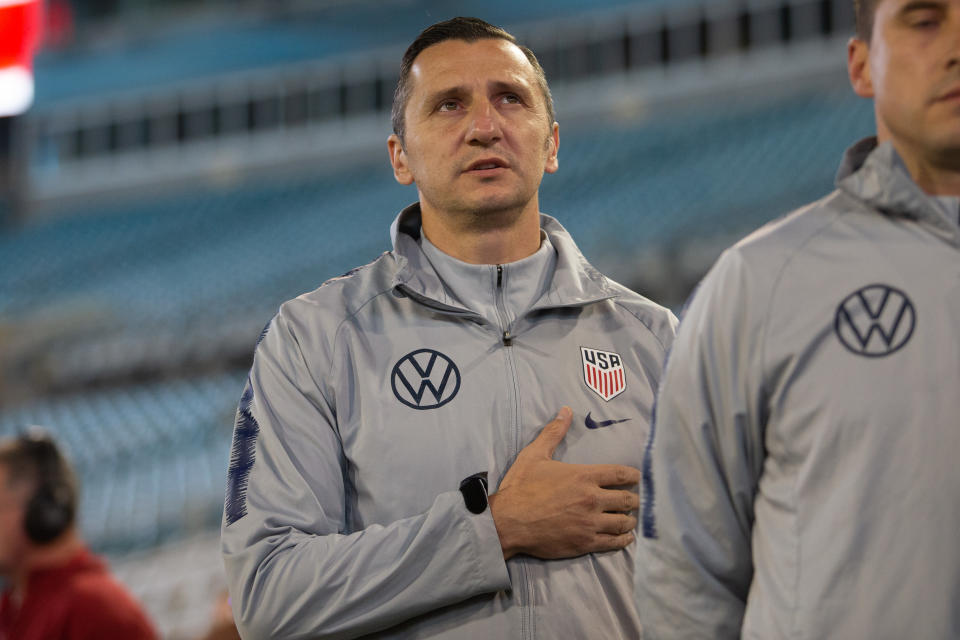Vlatko Andonovski's path to coaching the USWNT was unlikely — and uniquely American

Vlatko Andonovski still remembers the first time he saw girls playing soccer.
It was 2001 and he had recently left his native Macedonia for the first time to play soccer for a professional American indoor team, the Wichita Wings. Back in Macedonia, soccer was considered a man’s sport – Andonovski’s mother, Dona, had never even seen her son play in person because it was so unusual for women to attend matches.
But in Kansas, on the way to watch his friend coach a boys team, Andonovski stumbled upon a girls game and stopped in his tracks.
“I remember just standing and watching the youth girls game because it was so fascinating,” Andonovski tells Yahoo Sports. “They were so good.”
His friend, a teammate from Macedonia named Dino Delevski, teased him: “Hey, are you here to watch my game or these other games?’”
Andonovski joked back: “You need to get all these girls on your team – they are so good!”
For the man who would later become the coach of the U.S. women’s national team, arguably the top coaching job in all of women’s soccer, that memory hasn’t faded. He couldn’t have realized it at the time, but that discovery led to a life-changing career trajectory.
In Kansas, he eventually became one of the inaugural coaches in the National Women’s Soccer League, coaching FC Kansas City and later the Seattle Reign. His success in the NWSL, including two championships, made him a top contender for the USWNT job once coach Jill Ellis stepped down, and Tuesday he will play his first qualification match as the U.S. tries to secure a spot in the 2020 Olympics in Tokyo.
“I don’t think that’s the reason I started coaching girls,” Andonovski says of his memory of that girls game, “but it somehow just happened that I shifted to the girls side and I’m so glad that I did.”
From Skopje to Kansas
In retrospect, Andonovski’s path to the USWNT was an unlikely one.
Growing up in Skopje, a city in Yugoslavia that later became the capital of the newly formed Republic of North Macedonia, Andonovski’s life revolved around soccer.
Other than school, his days were spent playing soccer with his club, playing pick-up games in the street or watching games on TV. His father, his brother and two of his uncles all played or coached at the professional level. Eventually, Andonovski went pro too, and he did well enough for Macedonia’s youth team that he was in the pool for the senior side’s B-team.
Everything was going so well for a 24-year-old Andonovski that when Delevski called and asked him to join him in the U.S. at the Wings, Andonovski turned it down.
“My career was going well, I was happy with where I was heading, and I was like, how am I going to tell my family that I’m going to play soccer with walls?” Andonovski recalls now, laughing. “They’re going to think I’m crazy. So I told him, you don’t get it, I can’t do that.”
Andonovski had never heard of indoor soccer and he dismissed the idea outright, but his friend was persistent.

A week later, Delevski called again with a more persuasive pitch. For a defender like Andonovski, indoor soccer would allow him to influence and experience games in ways he never had before.
“He tells me, ‘Everything goes through you, you organize, you’re like a coach,’ so I was getting excited and I said, ‘OK, I’m gonna talk to my family,’” Andonovski remembers. “They were pretty supportive – but the walls part they couldn’t comprehend.”
Indoor soccer may not have been the career move that Andonovski or his family expected, but it was a chance to take a path that few others he knew had taken.
After all, although Andonovski was shielded from much of the war and unrest in the Balkan region at the time, the chance to try something that would take him elsewhere was intriguing.
“It was not a pleasant area of the world to be in at the time,” Andonovski says. “There were lots of things going on in the neighboring countries, lot of friends and family were affected. I wouldn’t say that’s the reason why I wanted to get out, but I wouldn’t say it wasn’t the reason.
“I never thought of it that way, that I needed to get out. I wanted to play soccer and coach soccer. It was a different path, and one not many other players from those areas took as a career.”
One month after that first phone call from Delevski, Andonovski had arrived in Kansas on a one-way ticket with two suitcases and almost no ability to speak English. It was for a six-month contract, and Andonovski figured if he didn’t like the U.S. he could just go back to Skopje when his contract was up.
Twenty years later, Andonovski is still here.
“I loved it instantly,” he says. “It was different but it was good.”
Representing America with the USWNT
For birthright Americans, the actual ceremony granting citizenship to those who immigrated here might seem a little underwhelming.
The exact proceedings vary from place to place, but typically in a crowded courtroom, everyone raises their right hand and recites an oath. If they are lucky, the government will provide little American flags they can proudly wave.
For someone like Andonovski, however, it’s something uniquely special. Andonovski decided within his first three years playing indoor soccer with the Wings and later the Kansas City Comets that he’d spend the rest of his life in the United States – but it became official when he became an American citizen in 2015.
“It is a proud moment,” he says. “I feel like this country has given me lots of opportunity and I’m thankful for it. As much as I lived in Macedonia, I feel like I am part of this country.”
No better way, then, to represent the U.S. on the world stage than by coaching the country’s pre-eminent soccer team, the U.S. women’s national team.
The USWNT is a step up from when Andonovski coached the Comets or in the NWSL, to be sure. These days, he’s in high demand, doing conference calls with reporters or squeezing in this call with Yahoo Sports before a day of preparing for Olympic qualifiers.
But the biggest adjustment for Andonovski has been at the training grounds. It’s easy to identify deficiencies on club teams and quickly see results by addressing them, but the players on the USWNT don’t have many weaknesses.
USWNT defender Ali Krieger says Andonovski has been a detail-oriented coach so far, being out on the field for every training session and zeroing in on the finer points of drills.
“I’m learning a lot,” Krieger tells Yahoo Sports. “It’s so enjoyable to show up to work every day and learn something new. That’s what I think a lot of our teammates really enjoy about being coached by Vlatko.”

That high level of quality amongst the national team players leads into the other biggest difference Andonovski says he’s had to adjust to: the ultra-competitive mentality amongst the players. As players fight to earn a spot on the final roster for this summer’s Olympics, the intensity of training camps has only increased.
“We’re working our butts off,” Krieger says. “Some of our training sessions and the scrimmages we play against each other are the most difficult of my career.”
The USWNT is famous for its strong personalities and unrelenting culture, which have pushed several coaches out of the job. Managing that aspect of the team may be as big a part of the job as drawing up Xs and Os – but Andonovski views it as a positive.
“It’s an extremely competitive environment where every touch matters, every movement matters,” he says. “It’s an environment set up by the players themselves. They set the standard. Not just this group of players, it’s a culture that’s been set up for 30 years. If you’re new, you’d say it’s a brutal environment, but being part of it is amazing.”
Andonovski wants to harness that by building an American team that is overwhelming for opponents.
He hasn’t had much time to work with the players since taking the job in November, but his vision for the USWNT is one that will overload opposing teams in the attack and smother opponents with disruptive counter-pressing defensively.
First things first, though: The USWNT needs to make it through the CONCACAF Olympic qualifying tournament, which starts Tuesday, and then he can tinker a bit more.
After that, he hopes his mother, Dona, will get to attend her first USWNT game.
She may have never seen her son play a soccer game in person, but she did watch him coach in the NWSL. Dona still lives in Macedonia, where now it’s more common to see women at matches and there is an active women’s national team, but she comes to the U.S. at least every couple years.
“The plan is for her to come and see the national team,” Andonovski says. “When she comes, if it so happens there are games, she enjoys the experience.”
Caitlin Murray is a contributor to Yahoo Sports and her book about the U.S. women’s national team, The National Team: The Inside Story of the Women Who Changed Soccer, is out now. Follow her on Twitter @caitlinmurr.
More from Yahoo Sports:

 Yahoo Sports
Yahoo Sports 